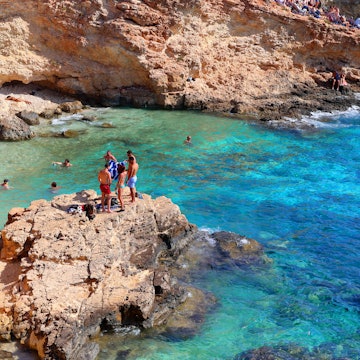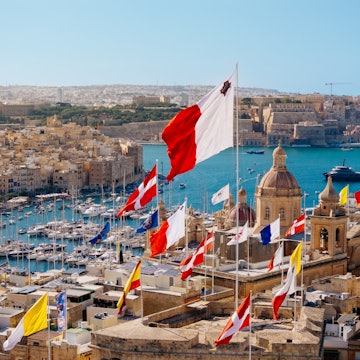

Wied il Gharsi is a perfect spot to spend the day floating © Matthew Mirabelli/Lonely Planet
Much-loved by European visitors for decades, laid-back Malta is attracting more visitors from around the world, beckoned by its prehistoric temples, fantastic scuba diving and buzzy Valletta, its beautiful capital.
We asked Brett Atkinson to craft a four-day itinerary designed to help unwind on this European island.

Spending a month exploring Malta’s multiple layers of history, culture and cuisine for the Lonely Planet guidebook was my third visit to the island nation. One of the Mediterranean’s most fascinating destinations will always be a favorite travel memory.

Why visit Malta
At the heart of Mediterranean Europe, Malta is one of Europe’s smallest countries, yet packs in attractions featuring fascinating history; relaxing and re-energizing outdoor activities; and a culinary scene influenced over the centuries by diverse cultures and empires. Explore the superb art and architectural heritage of the Knights of St John amid Valletta’s historic cityscape before discovering the Maltese capital’s cosmopolitan 21st-century eating and drinking hot spots. On Gozo and tiny Comino, getting active while hiking or kayaking are the best ways to experience the craggy coastlines of the archipelago’s smaller islands.
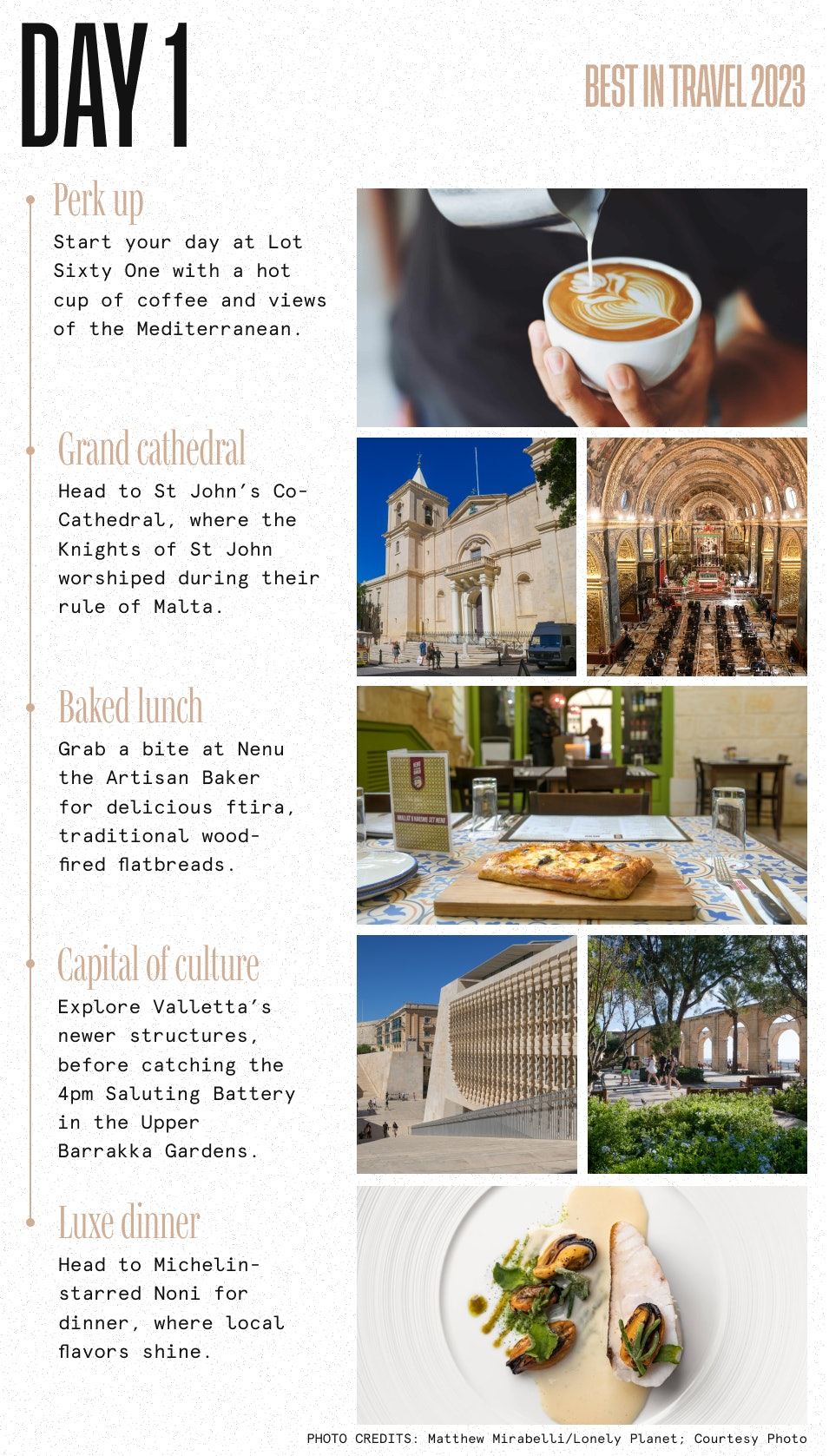
Culture, cuisine and history in the Maltese capital
At under 0.4 sq miles, Valletta is the European Union’s smallest capital city. Before exploring this compact peninsula, perk up with fair-trade coffee at Lot Sixty One: views down Old Theatre St from the cafe’s outdoor tables take in the Mediterranean’s sparkling waters. Built between 1573 and 1578, St John’s Co-Cathedral is where the Knights of St John worshiped during their rule of Malta, which lasted until 1798. Ecclesiastical treasures include the room-dominating painting John the Baptist by Caravaggio. For lunch, negotiate honey-colored stone streets to Nenu the Artisan Baker for delicious ftira, traditional wood-fired flatbreads topped with capers, olives and herbs.
Inspired by Valletta’s tenure as a European Capital of Culture in 2018, more-recent structures include the Parliament Building and the leviathan City Gate, both designed by Italian architect Renzo Piano. Continue nearby to the Upper Barrakka Gardens for the daily 4pm ceremonial firing of the Saluting Battery, a row of cannons that traditionally fired salutes to visiting naval vessels. Views extend across Grand Harbour to historic Fort St Angelo. Adjourn for a pre-dinner drink at 67 Kapitali, a popular bar serving craft beers from Gozo’s Lord Chambray Brewing, before settling into the centuries-old, stone-walled dining room at Michelin-starred Noni. Featuring local and seasonal flavors, dishes here might include such specialities as confit rabbit with poached figs.
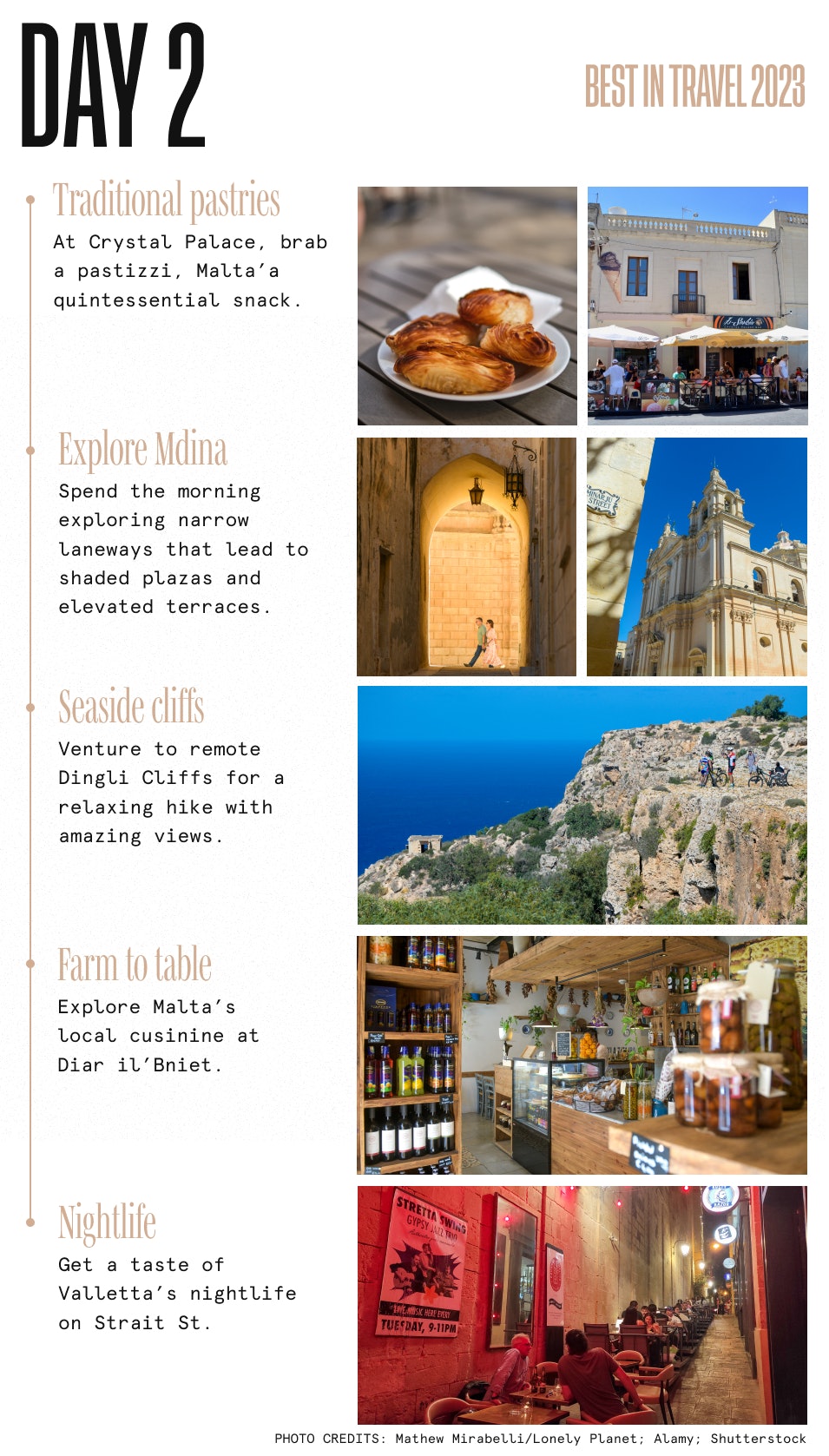
Mdina’s hilltop labyrinth and farm-to-table dining
Catch route 52 inland for 30 minutes from Valletta’s bus station to Rabat. At Crystal Palace cafe, enjoy a breakfast of pastizzi, traditional savory pastries that are Malta’s quintessential snack. From the nearby Howard Gardens, cross the bridge over the grassy defensive moat to the walled city of Mdina, then spend the morning exploring narrow laneways that lead to shaded plazas and elevated terraces with superb views stretching across the island. Mdina’s St Paul’s Cathedral was built in the 12th century CE, while Rabat’s ancient crypts and Christian catacombs date back some 900 years earlier.
After Maltese cheese and wine at Rabat’s popular Ta’ Doni, catch bus 201 west to the remote Dingli Cliffs. A relaxing, recharging hike along this wild and windswept promontory is best undertaken on well-marked coastal walking trails. Stop in at the Cliffs Interpretation Center to learn about the region’s unique natural, geological and archaeological heritage; from there, it’s an easy stroll from there to Dingli village and farm-to-table dining at Diar il-Bniet restaurant. (Booking ahead for dinner or lunch is recommended; cooking classes are also on offer.) After dinner, catch bus 52 back to Valletta for a nightcap at Yard 32, an intimate gin bar along Strait St, Valletta’s historic nightlife hub.
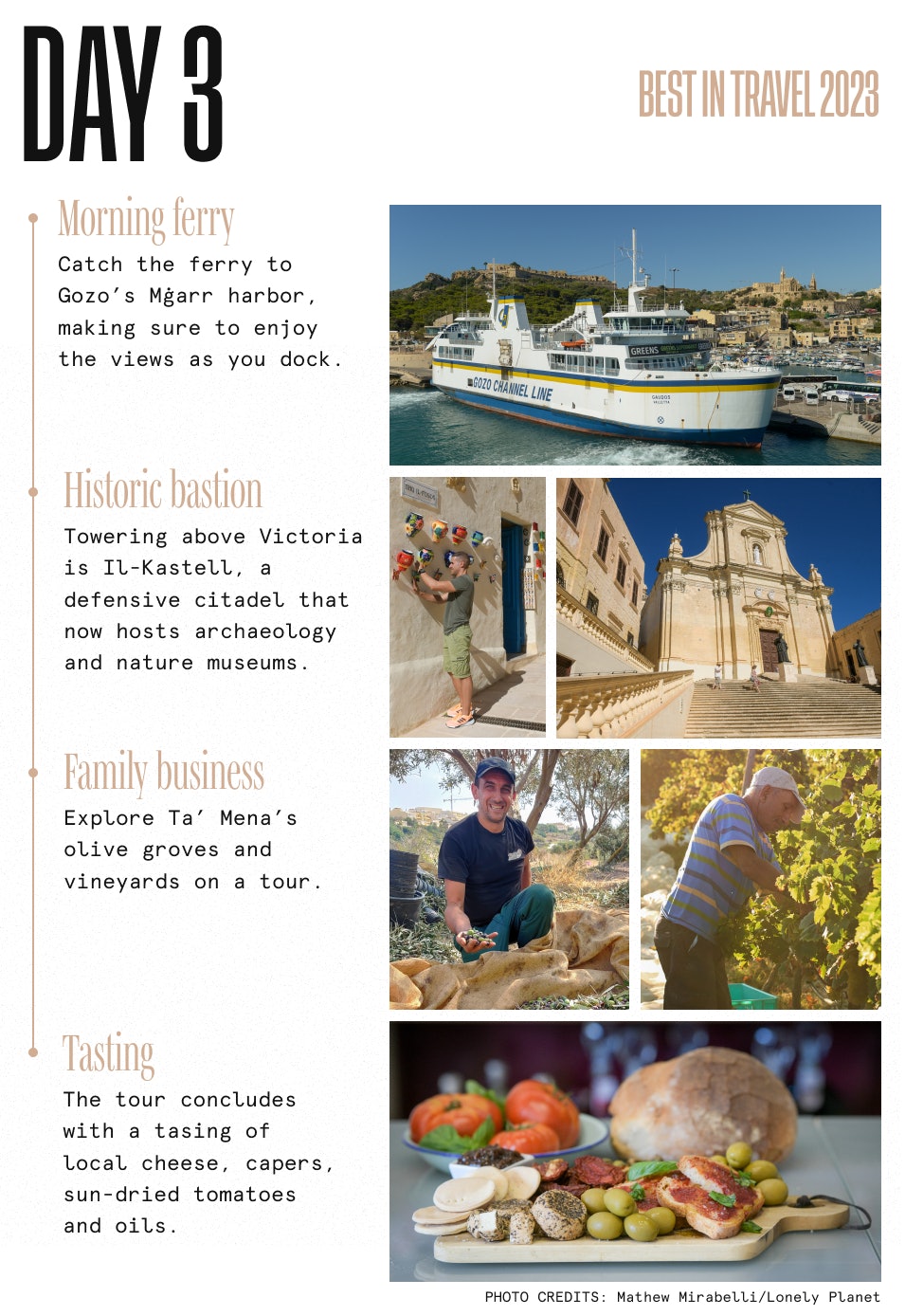
Gozo’s historic bastion and sun-baked vineyards and olive groves
From Valletta’s waterfront, catch the Gozo Fast Ferry to Malta’s smaller and less-populated second island. It’s a 45-minute ride northwest to Gozo’s Mġarr harbor, where scooters, e-bikes and cars can all be rented for independent exploration. From the harbor, make the 14-mile (22km) journey to Gozo’s capital of Victoria. Self-catering apartments in Victoria’s historic pedestrians-only backstreets are a recommended accommodation choice, with many featuring sunny rooftop terraces.
Towering above Victoria is Il-Kastell, a defensive citadel that protected Gozo’s citizens from Turkish raids until the 16th century. Today, the complex hosts archaeology and nature museums, its fortified walls looking out across Gozo’s terracotta landscape. Within the citadel, Ta’ Rikardu sells local produce including cheese and wine and honey: stock up for alfresco dining back at your accommodation.
After exploring Il-Kastell, experience more of Gozo’s food and wine credentials at Ta’ Mena Estate. A few miles north of Victoria, the family-owned enterprise has a farm shop selling wine – including the Girgentina and Ġellewża grape varieties native to the island – and local olive oil, capers and sun-dried tomatoes. Saturday morning tours start with explorations of Ta’ Mena’s olive groves and vineyards before concluding with a tasting of food and wine.
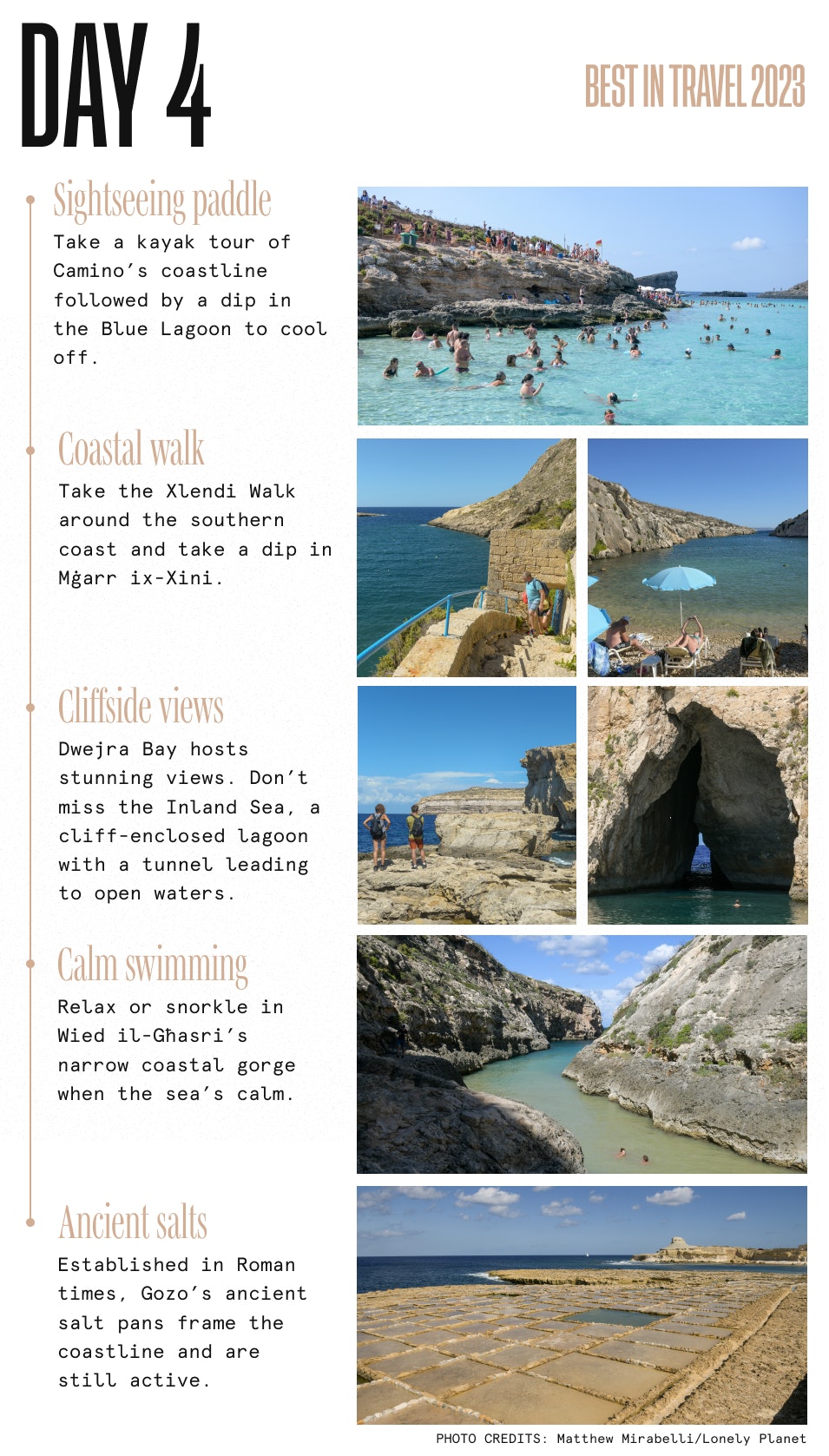
Exploring a craggy coastline framed by cobalt waters
After a few days eating exceptionally well, it’s time to get active around Gozo’s rugged coastline, which is dotted with clifftop trails and punctuated by improbably narrow coves, sea caves and wind- and sea-eroded coastal formations. Abseiling, rock climbing, hiking and mountain biking can all be arranged with Gozo Adventures, while half-day kayaking experiences explore the serrated coastline of tiny Comino, Malta’s third-largest island.
With your own transport, exploring Gozo’s wild side for a day is also an exciting option. South from Victoria, Mġarr ix-Xini was once the main harbor for the Knights of St John on Gozo; a historic stone watchtower still protects the slender, cliff-bound inlet. Starting at Mġarr harbor, Mġarr ix-Xini is also a stop along the Xlendi Walk, a 7.5-mile (12km) coastal trail negotiating the rugged cliffs and spectacular coves that line Gozo’s southern coast.
A highlight of Gozo’s western edges is Dwejra Bay – also traversed by coastal walking trails and the former location of the Azure Window, a rock arch that collapsed into the sea in 2017. Despite the demise of the arch, Dwejra’s coastal landscapes remain stark and spectacular, with boat trips negotiating the Inland Sea, a cliff-enclosed lagoon with a tunnel leading to the open sea.
North from Dwejra, Wied il-Għasri’s narrow coastal gorge is perfect for snorkeling and swimming when the sea is calm, while Gozo’s ancient salt pans frame the coastline further east at Marsalforn. From these pans – first established in Roman times and still used to harvest salt between May and September – it’s a journey of 8 miles (13km) to catch the Gozo Fast Ferry back to Valletta.








